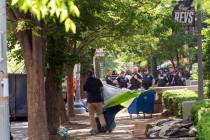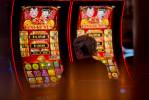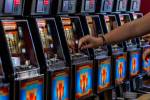We win as UNLV students compete to engineer the future
There are things that do not exist that should exist.
Such as health food that is tasty. A car company that will still be in business five years from now. Flying cars, ray guns, wristwatch TVs, a robot maid.
This is where the young come in. It is where they see a problem -- the vacuum is too loud, for example -- and fix it.
They do this because they can do it. They do it because they don't know they're not supposed to be able to do it.
Which is why a contest for a bunch of college kids offers the perfect laboratory for innovation.
It doesn't hurt that these particular college kids are UNLV engineering students, or that prize money is involved. Everyone loves prize money.
And so it was that 13 teams of smart college students gathered Wednesday to compete idea-for-idea in a battle whose weapons were innovation and common sense.
The biannual Senior Design Competition aims to push future engineers to apply what they've learned in the classroom to the real world.
Graduating seniors have to design and build a product and create a marketing scheme that actually works. All seniors have to participate, usually in teams of two or three.
The competition is judged by local professionals. The top prize is $2,500, with smaller prizes in smaller categories. Winners will be announced today.
Fred Cox, an engineering entrepreneur, provides the prize money. He said that after a lifetime in the engineering field, he wanted to give back a little.
"It's amazing what a little incentive will do for creativity and all that," he said.
Take Brandon Bechtol and Juan Plata, for example, who attacked the noisy Shop-Vac with a dome of polyurethane foam. It's so integrated into the machine you wouldn't know it was there unless you already knew it was there.
Their version of the ubiquitous garage-dwelling device is 80 percent quieter than the standard Shop-Vac and 99 percent as efficient, they said.
"It's got every feature the old one had, but it's quieter," Bechtol said.
OK. Simple. Someone should have thought of that long ago, right?
Then there's the pantry inventory system, put together by students Fernando Castro and Ron Nuval.
Castro said it was his wife's complaint that led to the idea. They were grocery shopping, and she didn't know whether they had tomato sauce in the cupboard.
"You need to do something about this," she said.
So, Castro and Nuval designed a system that scans and tracks the bar codes on all your foodstuffs at home. You delete an item when you've used it.
The next generation, these guys said, could be integrated with your cell phone, so you'll have your entire food inventory in your hip pocket when you go shopping. Voila, problem solved.
But wait -- there's more.
Chris Contreras and his team came up with one of those ideas that seems like it should have been invented decades ago: an automatic wine bottle opener.
And then they built it.
It's a little machine, about the size of a Coke can, you just sit atop the bottle. It does all the work. It screws its screw thingy into the cork and removes it slowly. No cranking involved. No pulling. No flailing or complaining or wondering why you stopped going to the gym.
Contreras said building the machine presented a few challenges, such as how big the motor should be and what kind of worm gear to use.
But it works.
Other stuff that seemed to work: a lug-nut remover, a tree pruner, an ergonomic laptop, a vending machine inventory monitor, a telephone encryption machine, a streamlined fax system, an ambulance alert system, a user-friendly LED lighting system, and a really cool headlight system for motorcycles.
Check this one out. Students Susan Doucet, Cameron MacAdams and Steven Hughes came up with it.
Hughes, who rides a motorcycle, said riding at night is always tough because the headlight points straight ahead, but sometimes you've got to turn.
Which means turning into the unknown. Stuff like oil slicks or debris can cause havoc.
So this team came up with a design that includes three small LED lights that are installed beside the main headlight. They point kind of sideways. A sensor turns them on when the bike leans over, as it would in a turn, and shuts them off again when the bike is upright.
Simple!
"It's something we'd definitely like to market to a motorcycle manufacturer," said Hughes.
That's always been easier said than done in this competition, which has been going on since 1999.
Rama Venkat, an engineering professor who helps put the contest together, said none of the inventions from the past are actually on the market, though a few should be (a device that alerts you if you've left your child in the car, for example).
Getting seed money and coming up with a business plan is often a lot harder than actually inventing and building useful stuff, he said.
He said the engineering department is working on ways to fix that problem, such as partnering with the business school or even starting an entire new program focused on innovation.
"We want them to become entrepreneurs," he said. "That's the goal."
Contact reporter Richard Lake at rlake@reviewjournal.com or 702-383-0307.























